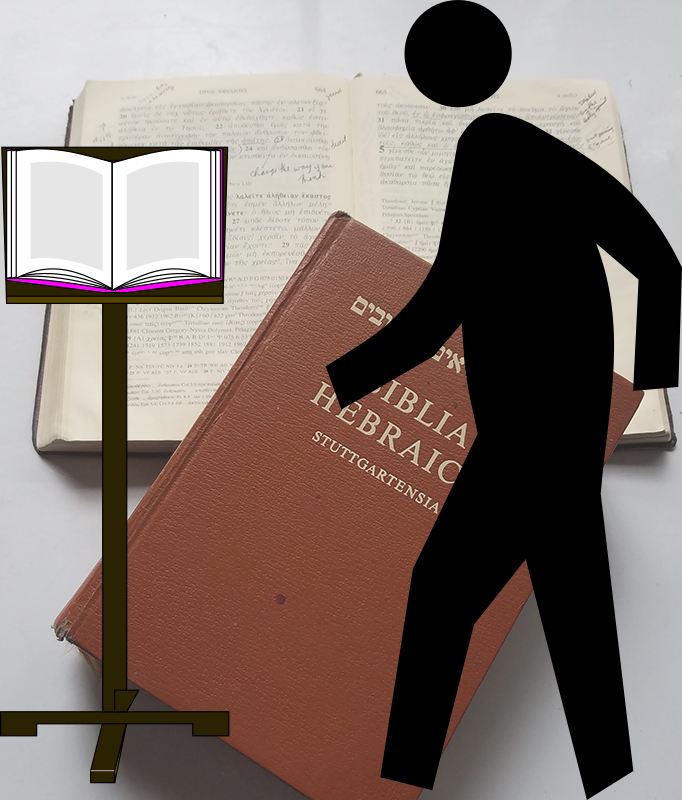Great Guide – Unreachable Goal
Pure exegesis is a great guide but an unreachable goal.
Pure exegesis is a great guide but an unreachable goal.

Yesterday I taught the Sunday School lesson for my class. The primary scripture was Exodus 32, the story of the golden calf. Our Adult Bible Studies title for the lesson was “The Permission Trap” and the goal was “To recognize the consequences of giving ourselves permission to do that which we know to be wrong.”…

These discussions seem to come up all the time about learning Greek, but the discussion also applies to Hebrew. How one can imagine it’s critically important to learn Greek if one is to preach or teach, but not so much to learn Hebrew, I don’t know. But the degree requirements of various colleges and seminaries…
Again, I’m announcing this late, but you can get more information on the Google+ event page, and you can watch using the viewer below. Note that the Q&A app will be active and you can ask questions or make comments.
You can go to the event for more information or watch using the embedded YouTube below. I’ll be talking to Thomas about the text of John and textual criticism in general for about half the time and then talking about John 17 in the second half with some discussion of rhetorical criticism.
From page xvii of Galatians: A Participatory Study Guide by Bruce Epperly — When we encounter scripture with heart, mind, and hands, the Bible comes alive and changes our lives and communities. We become the Galatians of our time, reveling in Christian freedom and living in the Spirit. We discover that God’s liberating Word, incarnate…
I have repeatedly heard the claim that the Bible has been translated many times, and that as a result of this, one cannot be certain of what it says. This is used in two different ways. First, skeptics claim that one cannot rely on the Bible because such translation will introduce errors. Second, there are supporters of the scientific reliability of the Bible who will claim that if it is just translated correctly, then we will discover scientific accuracy. In this second view, most or even all claims of scientific inaccuracy are the result of translation errors.
Let’s look at the basics of the process of translation, and the history of the Biblical text to see if these claims are justified. I’m largely interested in the second claim, which is often used in arguing in favor of creationism of one sort or another.

Yesterday I taught the Sunday School lesson for my class. The primary scripture was Exodus 32, the story of the golden calf. Our Adult Bible Studies title for the lesson was “The Permission Trap” and the goal was “To recognize the consequences of giving ourselves permission to do that which we know to be wrong.”…

These discussions seem to come up all the time about learning Greek, but the discussion also applies to Hebrew. How one can imagine it’s critically important to learn Greek if one is to preach or teach, but not so much to learn Hebrew, I don’t know. But the degree requirements of various colleges and seminaries…
Again, I’m announcing this late, but you can get more information on the Google+ event page, and you can watch using the viewer below. Note that the Q&A app will be active and you can ask questions or make comments.
You can go to the event for more information or watch using the embedded YouTube below. I’ll be talking to Thomas about the text of John and textual criticism in general for about half the time and then talking about John 17 in the second half with some discussion of rhetorical criticism.
From page xvii of Galatians: A Participatory Study Guide by Bruce Epperly — When we encounter scripture with heart, mind, and hands, the Bible comes alive and changes our lives and communities. We become the Galatians of our time, reveling in Christian freedom and living in the Spirit. We discover that God’s liberating Word, incarnate…
I have repeatedly heard the claim that the Bible has been translated many times, and that as a result of this, one cannot be certain of what it says. This is used in two different ways. First, skeptics claim that one cannot rely on the Bible because such translation will introduce errors. Second, there are supporters of the scientific reliability of the Bible who will claim that if it is just translated correctly, then we will discover scientific accuracy. In this second view, most or even all claims of scientific inaccuracy are the result of translation errors.
Let’s look at the basics of the process of translation, and the history of the Biblical text to see if these claims are justified. I’m largely interested in the second claim, which is often used in arguing in favor of creationism of one sort or another.

Yesterday I taught the Sunday School lesson for my class. The primary scripture was Exodus 32, the story of the golden calf. Our Adult Bible Studies title for the lesson was “The Permission Trap” and the goal was “To recognize the consequences of giving ourselves permission to do that which we know to be wrong.”…

These discussions seem to come up all the time about learning Greek, but the discussion also applies to Hebrew. How one can imagine it’s critically important to learn Greek if one is to preach or teach, but not so much to learn Hebrew, I don’t know. But the degree requirements of various colleges and seminaries…
Notifications